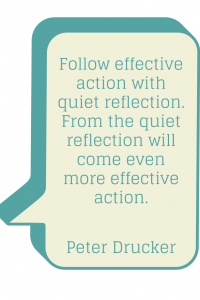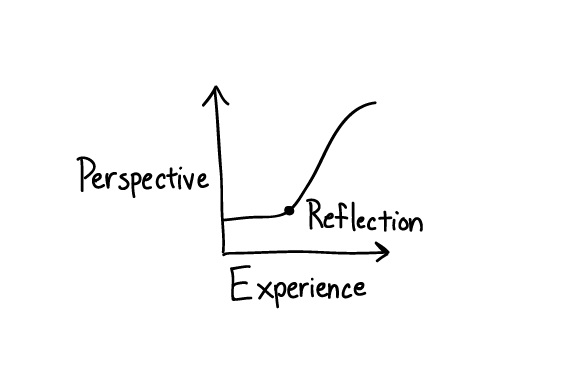When was the last time your calendar had an entry that earmarked time for ‘Reflection’. Of course, “Reflection” could take any label and many names, but with the intent of ‘reflecting’, or ‘intensely synthesizing” an experience or a result. My questions on this to a variety of people over the last couple of weeks, have saw a handful of ‘’overwhelming ‘yes’s” and a heap of hemming and hawing!
Nobodys fault. We just live in an age where ‘action’ has assimilated all the space that it had and shared with ‘reflection’ and ‘thought’ as the route to success. Having structured experiences has a huge focus on the experience, while as much focus must go into reflecting on these experiences. These hardly happen, except perhaps when this happens to be participants in an ‘outbound’ programme.
First things first. Reflection helps in learning and assimilation. Research has consistently pointed in this direction. The works of Dewey, Donald Schon, Kolbs and several others, consistently alluded to this. A new working paper by Giada Di Stefano, Francesca Gino, Gary Pisano and Bradley Staats lends further credence to that with greater aplomb. ( Get the full paper here )
This piece that Duke Today illustrator Jonathan Lee put together, is awesome on many counts. Amidst all the wonderful illustrations, this illustration below stood tall besides being very pertinent to this post.
Don’t we reflect? Of course we do. Thinking about various thoughts, conversations and ideas whilst doing something of routine is more often the case. Nothing wrong with that. While reflecting on the go, may quite well be a natural occurrence to many of us, intentional, focused synthesis of events and experiences lead learning to a different sphere. That is uncommon. Or rather, these are not practices in the mainstream. Reflection itself can be a natural consequence of several aspects.
‘Reflection’ facilitates the process of transforming tacit information and accrued experience into a codified knowledge base, adding several degrees of confidence. Just the possession at the end of the day, of such codified learning boosts self efficacy. This of course, requires cognitive investment.
Some of the best leaders who I have worked with over the years have always been those that have been able to hold conversations that helped me intensely reflect on several experiences on the job. In a connected, fast paced world, the ability to be able to hold the space for reflective conversations is at an implicit premium.
Journaling, having to ‘present’ the understanding etc help a big deal. Personally, teaching and further sharing of the results of reflection (including Working Out Loud) have helped me greatly. Surprisingly the paper mentioned above didn’t find evidence of increase in learning resulting from further sharing of it.
If you are a leader who is keen on facilitating a group into reflection this piece can get a good start. At the heart of it all, are three things in my opinion
a. Complete listening
b. Questioning
c. Allowing people to be
Being able to ask the right questions that facilitate reflection solves three quarters of the problems. That is a skill that can be acquired with constant practice. After asking the questions, to listen intently without interjecting with a point or two is also crucial. Some of my best conversations have been ones that left me thinking about it long after the conversation was over.
Gautam and me had this conversation on twitter.
Gautam’s point is well taken. It is my view that if it is made important enough, time will get created for it. It cannot remain in the fringes and remain and optional extra but must permeate as an essential means of completing work. It is every manager and leaders interest to give it the space it deserves. Of course, it needs to get into the calendar!
Reflection has continued to remain one of those things that we either take for granted or consistently undervalue its necessity. In my view, it has to be woven into work. Developing and exercising the muscle around facilitating reflection takes a person a great distance. Besides, it perhaps offers the simplest and most potent tool in developing people on the job!




A story did the rounds in 2008 that Vikram Pandit (now ex CEO of Citi globally) used to have a 2 hour time to think (TTT) on his calendar daily. That surely heled him steer one of the most beleagured behemoth through the morass of the financial crises.